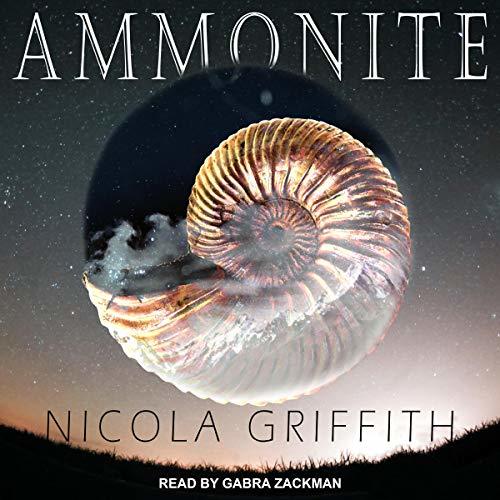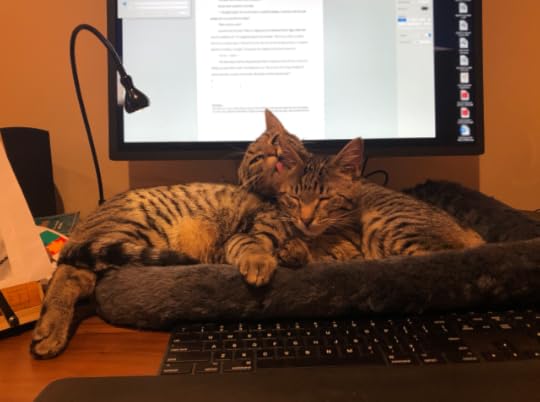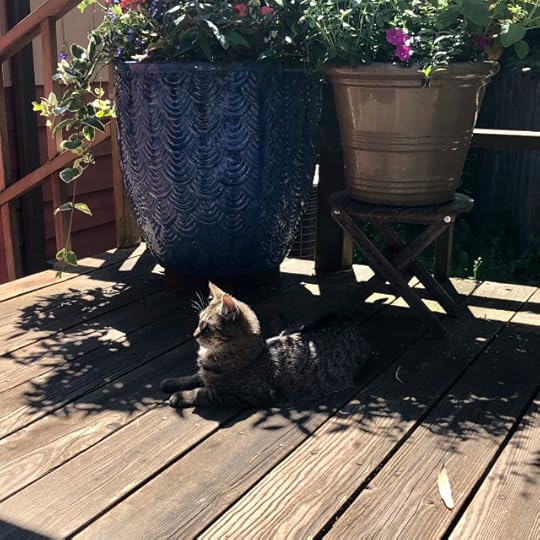Nicola Griffith's Blog, page 40
January 15, 2021
A is for Abattoir: Five words for 2021 so far
For many people we know, the word that best characterises the year so far is Shitshow. Oh, yep, I hear that. But for me and Kelley the first half of January has been a rollercoaster of events clustered around five slightly different words.
Word #1: Abattoir.
New Year’s Eve dawned upon a great slaughter. Charlie and George turned the house into an abattoir and war zone: two moles, one vole, and a bird. It was Charlie who caught most of them—including the bird—and George who ate them—including the bird. The bird, in particular, was messy. Charlie brought it in dying or just-dead (I heard him come in but didn’t see it), and proceeded to toss it around and get feathers everywhere. And I mean everywhere. Then he threw it into the Christmas tree, where it got stuck. So of course he had to pull off ornaments (one shattered) and countless branchlets and pine needles to get to it. After a while, though—once he’d got feathers stuck in his mouth a few times—he got bored, as he always does, and abandoned the bird for his dish of real kitty food. Enter George. But that’s a story for the next Kitten Report, coming soon. Back to the mainline narrative.
Word #2: Rewrite.
Just before the holidays—in our house usually Christmas Eve to the first Monday of January—I did my first rewrite of Menewood, cleaning it up, smoothing it over, taking out about 8,000 words. Then during the holidays I tackled the edit notes for Spear while Kelley read the rewritten Menewood. Spear is a short novel—less than 45,000 words—and Menewood a long one—more than 280,000 words, so their rhythms are quite different. But I think they both benefit from me swapping back and forth; there’s a kind of synergy between them.
The first rewrite of Spear is now done and back with the editor. It gained about five hundred words. This always happens. For example, most of Kelley’s notes on any particular draft consist mainly of How does she feel here? and Yes, but how does she feel? and finally, plaintively, WE NEED TO KNOW HOW SHE FEELS!! I always think it’s perfectly obvious how the protagonist feels—the reader can tell by what she does or doesn’t notice, what she does or doesn’t do—but I always grudgingly unpack things a bit, grumping to myself. And later, of course, I realise Kelley and my editors are always right. (Well, almost always. But, yeah, listen to your editors, kids.) I’ll expect a second edit letter for Spear before the end of the month.
Meanwhile, as Kelley read Menewood, every evening we’d chat about what she’d read—what worked, what didn’t, what she loved, what she found not entirely clear. (But how did she feel at that point?) I love these evenings: wine, conversation, writing, ideas… My idea of heaven, especially with cats purring in front of the fire, a stew bubbling on the stove and veggies roasting in the oven. On these days I love the world and love my life.*
Kelley finished reading and making her notes the day I sent the Spear rewrite off, so without any kind of break I plunged into the next Menewood rewrite. Unsurprisingly it took longer than Spear. Most of the work I did was to unpack emotional moments and explain a bit more clearly one battle-planning sequence. The end result? I put back 3,000 words—different words, better words. That went off to my agent the morning of Wednesday 6th January.
Word #3: Insurrection.
There I was, after I sent off the rewritten Menewood, feeling pleased with myself, and looking forward to a rare afternoon of doing nothing in particular—watching some deliciously unimportant TV or reading a no-brains-necessary novel. So after lunch I settled on the sofa with a cup of tea, some chocolate, and the TV remote. I happily clicked the power button…and saw a man carrying a confederate flag strolling across the Rotunda of the Capitol building, followed by jaw-dropping scenes of mobs chasing police up stairs, flash-bangs going off, and the president-elect accusing supporters of the sitting president of sedition and insurrection.
It was a surreal moment. I’m a US citizen born and raised in the UK. For the last 20 years I’ve been telling anyone who would listen that this country was heading for a cliff and if people didn’t fucking take these right-wing arseholes seriously they would wake up in an autocracy with no escape. No, no, everyone would say; it couldn’t happen here. But, I’d say, it is happening here, right now: Look at this, and this, and that. And eventually, as you probably noticed, I just stopped talking about it in public forums. So one thing I want to make clear is that I was not in the least surprised by a white supremacist, Trump-supporting mob to attack the Capitol. Similarly, I was not surprised that armed white people weren’t overwhelmed by militarised law enforcement, beaten or killed, and then rounded up, thrown in a cell, and made to eat the key—as would have happened, did happen, with any number of peaceful protests, particularly Black Lives Matter marches.
Nonetheless, seeing lawmakers in gas hoods, seeing that noose strung up outside, seeing law enforcement running or being beaten by white middle-class Americans was surreal. I think what made it even more difficult for me to bring the seriousness into focus was seeing these insurrectionists blithely taking selfies and posting them on social media. That and seeing Republican congresspeople openly encourage the attack. I’m not a person who doubts herself much, but seeing these images made me wonder if I was living in a different world to these people where the notion of consequences had a different meaning.
I turned it off. Drank my tea. Turned it on again. Texted Kelley who was in a Zoom meeting: I’m watching jaw-dropping scenes… By this time the talking heads were just rehashing what I already knew so I turned it off again. After I resolved to donate whatever my next stimulus cheque ends up being to local food banks—because I think it’s the most useful thing I can do to help anyone in this world right now—I did my best to tune it out. No point fretting about things I can do nothing about; it’s outside my zone of control. Whatever happens with the impeachment is not something I can influence, so I’m not going to pay attention.
Word #4: Reading.
Like most writers, I get get many—I mean many—requests for blurbs. I refuse almost all of them (and still do at least a dozen a year). But late last year I got two ARCs for novels written by queer BIPOC writers at or near the beginning of their careers. Why would I say no to that? The problem: I had just one week to read both and come up with something enticing—all while still feeling as though I were living in an alternate universe, dealing George-related stress, and of course my old friend fatigue. In the end, it worked out pretty well, most likely because they were extremely good novels; I was delighted to be able to offer heartfelt praise.
By this time I was feeling super seriously tired and in need of a break.
Word #5: No.
No will be the watchword of my first quarter of 2021. Want me to blurb your book? Unless you are a friend, relative, or former student—or the project is seriously interesting or well paid, preferably both—the answer will be No. Want my advice on crip characters in your work-in-progress? No. Want me to look at your query letter? No. Want me to teach/join your board/do an interview? No. Contribute a story/essay/book chapter to your project? No. Judge a competition? No. There are many things I’m already committed to this quarter—stories, proposals, teaching, essays, etc—and those commitments I will fulfill. New ones? Not so much.
So what will I be doing? Writing, mostly. Also loafing about, sorting out the house (it needs a lot of work), teaching, rescuing cats, reading, and generally having a life. I think it’ll be pretty cool to not be so tired I can tell the difference between Good Things and Bad Things. I’m looking forward to having grownups in charge of the country in just a few days. Do I think Biden/Harris are endowed with political, social, and economic superpowers and can magically right all wrongs? No. But I think there’s a fighting chance that at some point in the next few months the deterioration will slow to a halt, and gradually revers. And I want to have the bandwidth to witness that—or, y’know, deal with un/foreseen horrors.
The beginning of 2021 has been a rollercoaster ride so far. I want to have the strength to deal with what’s next.
*Eh, I always love my life and almost always can find something to love abut the world, but these days/evenings are especially precious; they are the heart of who we are.
December 31, 2020
2020 Adieu
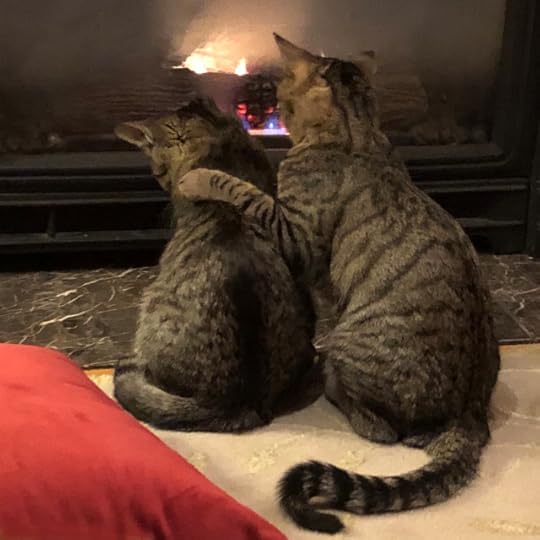
Charlie and George bid 2020 adieu
Charlie and George bid farewell to 2020. The photo is from last year because the beasties are too busy murdering small things right now to pose. (Body count in the last 24 hours? One shrew, two moles, and a bird—not to mention a white carpet.)
May you have a peaceful New Year surrounded by warmth and comfort.
December 30, 2020
2021: A Look Ahead
2020 sucked for many people. For many, too—though sadly at least 2 million fewer than might have been the case, absent the pandemic—the first half of 2021 will also be difficult. Beyond that simple assertion, I’m wary of making predictions.
This time last year I wrote a couple of longish posts, a look back, 2010-2019: A Decade in Review, and a look forward, The Third Decade of the 21st Century. That latter was basically a detailed explanation of why I wasn’t going to make any predictions:
I am pitifully crap at predicting the future. The most seriously I’ve ever tried was writing Slow River in 1993 (published 1995). Oh, I did get some things right: Bioremediation and the need for it (though today we’re doing much, much less than we could, and we need it much, much more than we did). Data ransom. An increasing divide between rich and poor. Charity as fashion. Older people feeling like digital immigrants and strangers in their own culture. But I completely missed social media, the rise of online commerce, and the ubiquity of asomatic (extrasomatic?) connectedness, for good and ill.
So the only thing I’m reasonably sure about in terms of prognostication is that in two weeks we’ll be writing ‘2020’ on our cheques. Except, oh wait, we mostly don’t write cheques anymore. And maybe some deadly pandemic, unexpected asteroid, or nuclear holocaust—or just someone careless tripping the national grid leading to a cascade of devastating effects—could render this notion of money, or even the people who might need it, obsolete.
I chose those three disasters for the simple reason that they’re no-brainers—they’re always true—and our world is so complex and interdependent that it could easily end any time, even without anyone doing anything idiotic or malicious. And in fact, there was (and still is) a deadly pandemic; there was at least one unexpected asteroid; and the Russian hacking and insertion could easily have triggered a civilisation-ending collapse of our infrastructure if Putin had felt like pushing the button and turning business-as-usual espionage into an attack. And money—well, money is still with us, but cash has become vanishingly scarce for those lucky enough to still have credit. But here’s the thing: the prediction I missed the first time—the extrasomatic communication? It saved my sanity (and that of many others, I think) and I just, well, I didn’t expect to ever be grateful for Zoom (and Google Meet, and Skype, and FaceTime).
And here’s the other thing: in 2020 the world didn’t end.
But the best thing of all? I believe the world in 2021 is slightly less likely to end than it was in 2020. So…Yay?
Ah, screw it! Definitely Yay!! As someone on Instagram pointed out a couple of weeks ago, 1.20.21 is the world’s most anticipated palindrome. In less than four weeks we’ll have grownups in charge again (at least here in the US; the UK, well, I feel for you extremely—hang in there). It’ll take a long time to even begin to redress the harm Trump and his cohorts have inflicted on the world, but I think a Biden/Harris administration will make a good start. Or they’ll try. Obviously they will have to find their way past many obstacles, the rocks in the road like Mitch McConnell, but not being motivated by greed or malice will make many more good things at least imaginable.
So this year I’m just going to cross my fingers and say only that I sincerely hope that:
the Covid vaccine works
the Biden/Harris administration miraculously finds some way around the partisan gridlock that’s plagued US politics for the last 20 years.
1. Covid. To work, the vaccine must not only be effective at the biological level but also have wide take-up. And by wide I mean all the anti-vaxxers and the vaccine-hesitant get over themselves—and if you believe the polls they are beginning to—and that rich countries do the right thing and fund the production, transport, and administration of vaccination for populations that might not be able to afford it. Assuming this happens, we then need immunity to last a few years. And after that we need the virus not to mutate in ways that make it either a) more deadly or b) able to evade vaccine-induced immune response. Further, we then need the population of the world to keep wearing masks and following social distancing precautions for a while until we have true herd immunity. (But, again, the polls are hopeful on this point.) So how likely is all this? I don’t know. My hope is that it’ll happen, and by this time next year the pandemic will be largely in the rear-view mirror. But I am by no means certain.
2. Biden/Harris. What would help the most for the incoming administration would be for Georgia to elect two Democratic senators. Will this happen? I doubt it. On this I would love to be wrong. But even if I am wrong, that leaves razor-thin margins in both chambers and therefore the potential for disappointment when it comes to sweeping change. It could bode well, though, for infrastructure projects, which this country desperately needs—and would be good for employment and therefore the economy. In terms of social justice? I don’t know. the White House will no longer emit malicious Executive Orders in an endless stream designed to humiliate entire populations and/or enrich the already-rich and powerful—so, hey, there’s one improvement we can rely on. Given the current conservative majority on the Supreme Court I have deep concerns about the future of certain protections—for queer folk, trans folk, women, BIPOC, disabled folk. A 6-3 majority could lead to all kinds of dismantlement of rights some of us are only just beginning to take for granted and others thought they might have a hope of seeing soon. Obviously, a Biden administration could then encourage Congress to pass actual federal laws to take the place of previous legal precedent—but as soon as you drag religious freedom into the mix things get very, very tricky. As I’m fairly sure SCOTUS will be doing that a few times in the coming year, buckle up.
Beyond these two things I will only say, again, that I’m super crap at making predictions.
The only things I’m very sure of—because they are in my control—are that Kelley and I will be doing our best to love each other and the world, to take joy as and when we find it, and to create and share joy as and when we can. May 2021 be kind to us all.
December 28, 2020
2020: An unusual year
I considered titling this post 2020: The Fuckening. Trump, his people, his party, and the Covid pandemic fucked with us all—some very much more than others. While I certainly did not have an easy year—with my health, for one thing—I also know that Kelley and I were and are luckier than most. Many others had, and, until we have some kind of working herd immunity, and even lost past that, will continue to have a much worse time. Even so, for me? Not an easy year.
In the first half of 2020 the only thing I was thinking about, apart from writing, was SARS-CoV-2. Each post I drafted was progressively more depressing, though, so I eventually stopped posting them. I kept researching, and making notes, and drafting posts no one would ever see—as a kind of journal—until one day in spring I had an iPad/iCloud catastrophe and lost all the notes. It was a weird relief. I realised I had zero desire to recreate them, or to continue collating data. So I stopped. But there was nothing to take its place: I wasn’t going out in the world doing things or meeting people; the news was mostly unbearable; I couldn’t take part in the Black Lives Matter protests; and it was hard to focus on reading. I spent much of my time in various doctors’ offices, trying not to despair about politics, and writing. When I’m in the middle of a writing project I don’t generally like to talk about it much, so I didn’t have much to say. So: I wrote fewer than 40 posts in 2020—which is about 10% of my output ten years ago.
As I say, Kelley and I are luckier than many. We live in a lovely neighbourhood stuffed with natural beauty, peace and quiet. Best of all, our neighbours are kind, generous, and thoughtful, and this cul-de-sac forms a tight community. Our house, too, is pretty much tailored to the kind of social isolation we’ve been experiencing. We have a three-bedroomed house, two of which we converted years ago to comfortable, efficient individual offices with excellent connectivity. We’e used to living in each other’s pockets 24/7 and to working remotely, and we delight in each other’s company. Plus we have two very private, flower-adorned decks; we could almost always find some bright, sunny, birdsong-laced outdoor retreat to enjoy in summer—when, y’know, there was sunshine and the smoke wasn’t choking us to death. On top of that, Kelley has a day job that pays well, she enjoys, is good at, and is designed for remote working.
These factors, plus the fact that neither of us had to travel—this is the first year in our lives together that neither of us has boarded a plane—combined to turn what for many was a worrisome and precarious year into a year of unusual emotional, physical, and economic stability for us.
The new decade began promisingly with Kitten Report #12. In which Charlie and George tear into the new year (operative word being ‘tear’) with enthusiasm, growing like magic beans. They were mesmerised by their first snowfall, and I was mesmerised by their mesmerisation. George, in particular was becoming enormous.
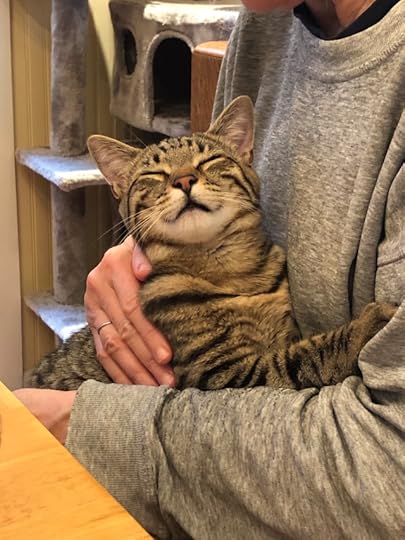
George grows and blisses out
I was working well on Menewood and watching with increasing concern the epidemiology reports from China, as well as cooking up A Hild Companion, a collaborative, accessible guide to Hild and the novel’s Early Medieval context. the book—and accompanying website—are designed to appeal to scholars who might teach the book to undergraduates, scholars who may want guidance into certain areas of the field, and lay readers who wish to pursue the history/historical context of Hild in greater depth.
It was around this time that i could no longer resist posting about 2019-nCoV: the new coronavirus. I very deliberately downplayed the situation as I saw it, because I knew that saying what I really thought would either frighten people off thinking about it at all, or make them scornful and dismissive—and so also likely to stop listening. So I aimed for a Hey, this is interesting—want to play along with me? tone. But I don’t mind admitting I was extremely concerned—I looked at the fatality rates and R-0, did the math and thought, Oh, fuck. I had already ordered masks, sanitiser wipes, an assortment of household necessities and was trying to persuade Kelley of the utility of buying a new chest freezer and stocking it.
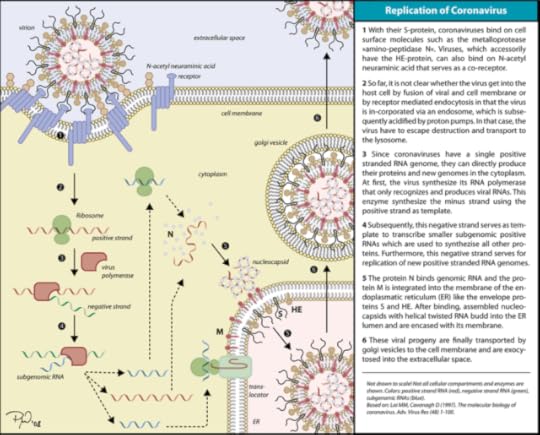
Crenim at English Wikipedia [CC BY-SA (https://creativecommons.org/licenses/by-sa/3.0)%5D
In February I did two Covid updates. In the first, 2019-NCoV: an update, again to avoid reader distress, I split the post into a Just the Facts, Folks section filled with unemotional facts and figures, and a Speculative section with all the scary extrapolation. At this point no one seemed to be talking about the economy, and I thought I might at least mention the possible horrors ahead.
Science was moving amazingly fast and a couple of weeks later the virus had a formal name, SARS-CoV-2, as did the illness it caused. I wrote another Covid-19 update, this time railing against all the weasley WHO and CDC clap-trap about trying to prevent a pandemic when, in my opinion, SARS-CoV-2 was already out of the box, and Covid-19 already, clearly, a global pandemic. I repeated, for the third time, the need for people to stay the fuck at home, wear a fucking mask, and wash their fucking hands. How many of you were doing this? Not nearly enough. At this point, Kelley and I went into isolation—with one brief exception, a lunch with a friend who also took precautions super seriously.
In isolation, the world continued to turn, and I did an interview with Wordgathering: A Journal of Disability Poetry and Literature, in which, among many other things I talk about what fiction can do that memoir cannot.
In March I did three coronavirus updates. The first, Covid-19: Now what? was written in yet another attempt for people to take this thing seriously and take at least basic precautions, which I listed. Again. At this point there were 6 US residents dead, and I knew that would soon become a flood. Yet organisations were still planning big galas and other events as though nothing was happening; it was driving me up the wall. A few days later, when Washington State finally started issuing restrictions, I wrote COVID-19: Numbers game in which I talked about case fatality rates and why they weren’t useful numbers, and how almost all the other numbers people were floating were really, really wrong: gross underestimates of the problem.
By this time the West Coast and parts of the East Coast were beginning to understand that this was not going to be over in a month, and many online reading series and bookclubs began to spring up. For a while I was super busy with raising-money-for-good-causes events. This was a time when what felt like half the reading world rediscovered Ammonite because, well, it’s all about a virus that causes a global pandemic. Coincidentally Ammonite was just being released as an audiobook for the very first time.
I wrote a list of Good books for hard times, for all those asking for reading recommendations. Then a little while after that I posted for the last time on COVID-19: Zones of Control. The title is pretty self-explanatory: control what you can, including your behaviour towards others; kindness is what will save us. Then I took my own advice and stopped trying to change the world’s response to Covid, and stopped talking about it.
Instead, I was doing interviews and readings, and the only mention I made of Covid was explaining Charlie and George’s response in Kitten Report #13: Social Distancing.
May marked Charlie and George’s first birthday and Kitten Report #14: One year in the world. For their birthday present, we let them out in a brief, supervised visit to the back garden; it did not go well. Charlie ended up on the roof and, copying a passing bird, tried to fly. He was fine, but I’m not sure my heart is still trying to recover.
May also marked the second anniversary of publishing So Lucky, and I had many thoughts about disability, ableism, and publishing: So Lucky is 2: Some thoughts. By this time isolation was seriously beginning to bite and I, like so many in lockdown, was having to figure out how to deal with the new reality—for which hair became my stand-in for the universe: regain control of my hair and regain control of my life! Yeah: no. I detail all my mishaps in Adventure in homemade hair, along with photographs. Meanwhile the interviews and readings were increasing. For me, the problem withe video readings is they’re a lot of work for very little reward: none of that wonderful performer-audience connection. So while I did a few, such as the Clarion West/Fight For Our Lives reading, I resolved to not do any more this year.
Mentally and emotionally, isolation is hard. Zoom helps, but Zoom cocktails, and Zoom coffees are not a patch on in-person meetups. They are very much better than nothing, but I can’t wait to get back to being in the presence of that cellular hum of other living beings. I talked a bit about coping in Self-care in the time of coronavirus and how I was beginning to ignore emails and messages in favour of just sitting outside among the flowers with a book, a cup of tea, and a cat. One minor flaw in that plan was that I hadn’t yet been able to sort the garden properly yet: coronavirus-caused supply chain issues meant that nurseries and big-box stores either had no decent plants or only bizarre choices. the deck flowers got off to a slow start this year, which meant that every time I went outside to relax I ground my teeth in irritation at all the work still to be done. At least I could always look through the window at the front garden which was in pretty good shape.
The end of June marked the 32nd anniversary of me and Kelley meeting at Clarion and falling in love. I talked about it a little in 32 Years: A Life.

At least the front garden looked good
By July the kittens owned the entire house, gardens, and surrounding domain. In Kitten Report #15: Einstein Houdini Ferociraptors I detailed my escalating war to keep them locked in at night, their increasingly inventive escapes, and their final, deliberate, diabolical (temporarily) successful attempt to lock us out of the house.

Not Alcatraz but…
Finally, in August, the deck flowers starting settling in—and I posted many photos and videos of Flowers, cats, birds and bees.
This is also when Slow River is 25, and I take a look at just deep an influence that novel has been on my life and career.

Current US cover, current UK ebook, original US cover, current UK print edition, orginal UK edition
September was a hard month. For the first time in nearly 25 years—since before there were blogs when I set up a crude Ask Nicola page on my website—I posted nothing for over a month. Here in Seattle hunker down had become total lockdown: wildfires from Eastern Washington to British Columbia to Oregon to California were raging, and due to a cruel twist of climatological fate, all the smoke poured towards Puget Sound. The air quality index went from Good to Moderate to Unhealthy to Very Unhealthy and, finally, to Hazardous. Me, Kelley, and the cats couldn’t leave the house. Even running our HVAC with super HEPA filters—even wearing a mask between the front door and the van when I had to go to medical appointments—my health deteriorated. Oh, my lungs were fine, but my inflammation levels went through the roof and I ended up with what neurologists call a pseudo-relapse of my MS. Long story short, I was in awful pain for a long time, and had to drug myself into insensibility.
Many good things happened in September, too, of course—Kelley and I celebrated our 7th and 27th wedding anniversary; we both turned 60—but I wasn’t inclined to talk about them as they were occurring. Here’s a photo of Kelley at 60, looking more herself, and therefore more beautiful, with every passing year.
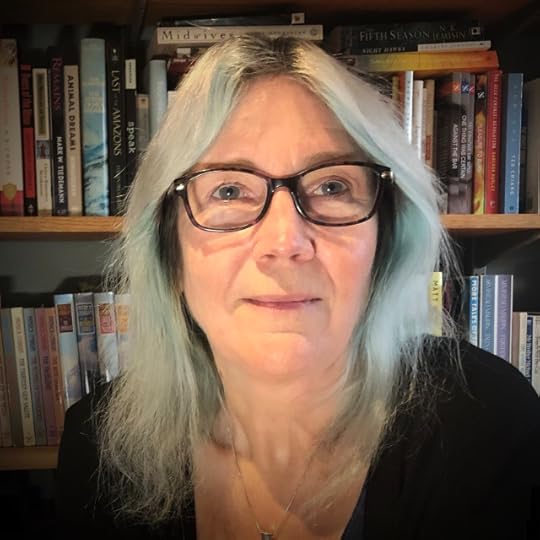
Kelley at 60
The photo of me was taken just a couple of months before I turned 60, a still taken from a reading video (and pretty low-res).
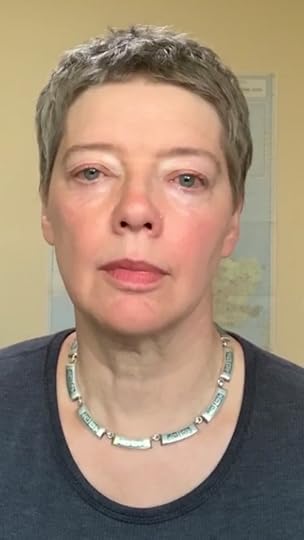
A still from a video reading I did in summer 2020: two months before I’m 60
And, just because, here’s a photo of the wine we drank on Kelley’s 60th birthday. We’d been saving it twenty years, waiting for a special occasion—and this qualified. Also? So worth it!
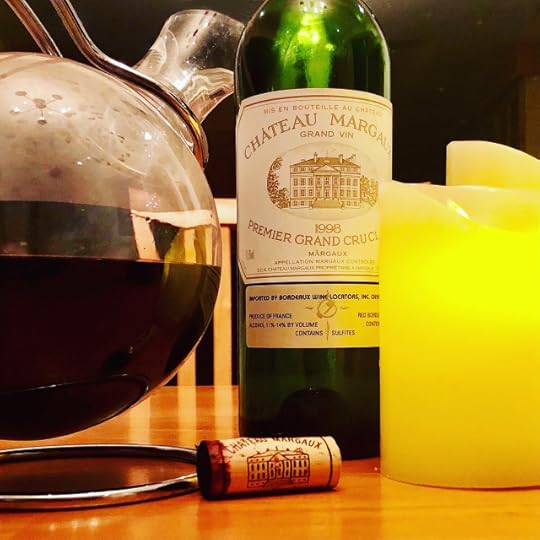
Wine at 60
I wasn’t much inclined to talk much in October, either, only doing one post about Vonda McIntyre’s The Exile Waiting. This silence was partly a function of illness/pain/pain meds but mostly due to being wholly focused: working like a demon on Menewood. (An unexpected bonus of laser focus: no time/energy/inclination to pay attention to election madness.)
In November, I began to feel a bit better. On the night before the US election I finally finished a draft of Menewood. After the election winners were sorted beyond reasonable doubt, I was finally able to delight in and shout about MENEWOOD!!
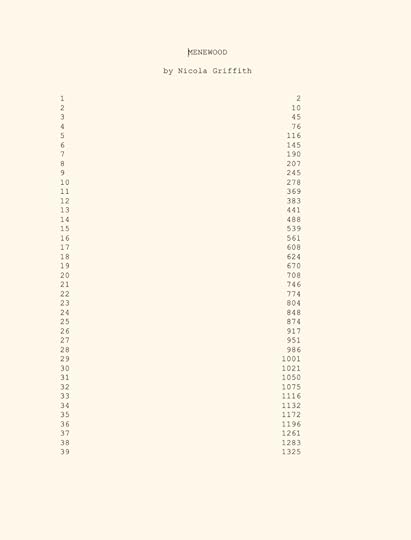
A monster is born…
It’s a hugeous book: 40% bigger than Hild. But I’m proud of it, I think its really fucking good, and as I rewrite it will only get better.
Also in November, the day of the election, I explained how to make our custom Election Day Cocktail: The Brandy Bramble. Even if I do say so myself, it’s excellently tasty.
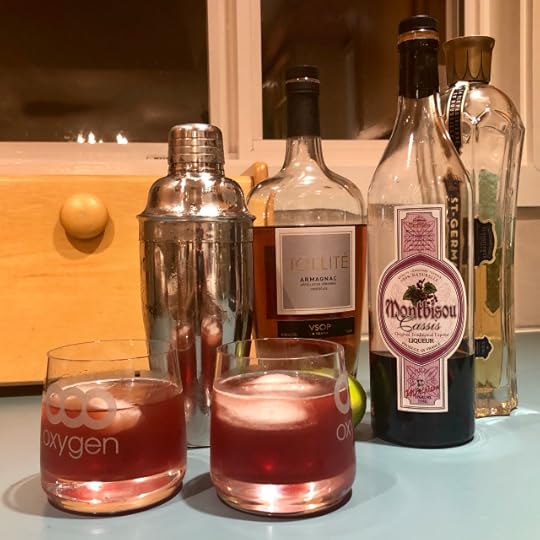
Brandy Bramble
And finally in November I posted Kitten Report #16: 18 months old. In which Charlie and George observe a moment of silence for RBG, then pose (in the words of a Facebook commentator) as an 80s synth band who have lost their hairspray.
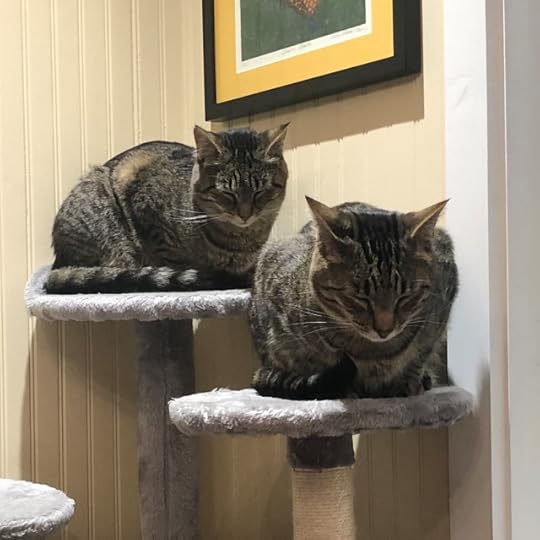
A moment of silence for RBG
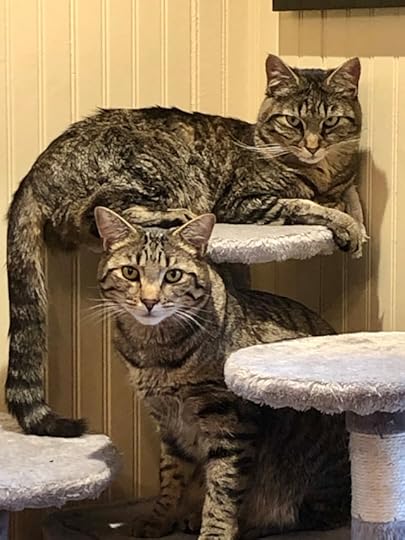
Demon Kitty and the Confused
By the beginning of this month, for the first time in four years, I am beginning to feel the first faint stirrings of hope—Biden/Harris, Menewood, finding myself pain free—and I finally start posting more again. I start with a partial explanation of my near-silence for the last couple of months, with a post about nerve pain and how pain meds give me Manatee Mind.
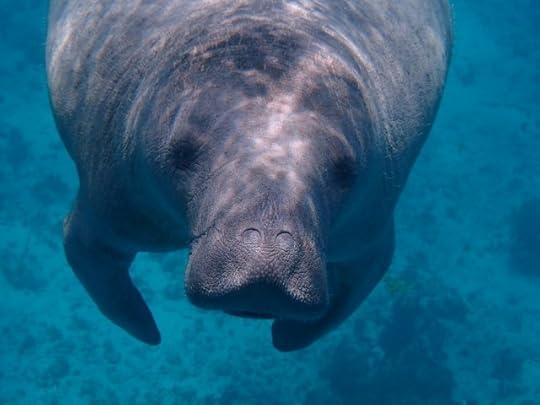
Photo by Maegan Luckiesh on Unsplash
Then it’s December 11, and in Love and Isolation: 31 years ago I talk about how weirdly similar today’s physical isolation is to how it was for me when I first came to this country to live with Kelley more than three decades ago. Then—finally!—after holding my tongue for months, I got to talk about Spear—my short fantasy novel. Writing this book was pure joy from start to finish, and I can’t wait for you to read it, which you’ll be able to do in April 2022. The whole blog post is an exploration of my astonishing (to me) burst of productivity this year, in which I wrote more than 200,000 finished words. I know there are other writers in the world for whom 200k is just something they do before Tuesday, but for me it’s a mind-blowing, game-changing explosion.
I attribute this productivity to three things. One, we got a brand new superautomatic espresso machine—and, holy shit, a triple-shot Americano? A thing of beauty and rocketfuel.
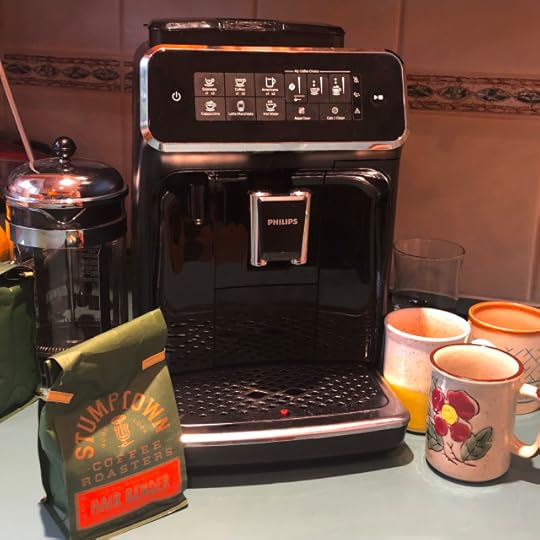
The secret of my success?
Two, not travelling, not going out for dinner—or to the pub, the boxing gym, or bookshop—freed up all kinds of time and energy. It turns out avoiding all communication except the occasional Zoom cocktail, really cleared my calendar. I felt really free. And then three, the sheer joy of writing something just for me, just plunging into the unknown without a map, broke all constraints. It’s been a while since I did that at any length. It’s usually my short fiction MO, for, say, “Glimmer,” or “Cold Wind.”
“Cold Wind” is an old story, but it occurred to me that it would be perfect for a dark winter’s Solstice story, so I made a wee PDF, illustrated in a combination of magnificent art by Rovena Cai (below) and photos I digitally altered to look snowy and/or menacing. Then I put it on my website for free download. I’ll leave up for another month or so.

Cover illustration by Rovina Cai
After that I posted my final interview of the year., Since then a post or two of end-of-year stuff, like this one.
In a couple of days I’ll do the last post of the year: a look forward to 2021. Meanwhile I’ll figure out what were the top fifteen posts this year and make changes to the list in the sidebar. At this point I have’t even looked at blog stats and, like blowing up the Christmas tree, that might be an annual ritual I forgo this year. Life is short; I’d rather be writing, sitting with a cat on my lap by the fire, or talking to my sweetie.
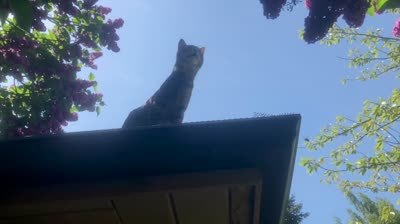
December 25, 2020
Holiday Greetings From Various Beasties
I couldn’t find any decent FX this year for the traditional blowing up of the tree, so I intended to make another kitty card—then ended up not having any time to do that. So here instead is the greeting from Charlie and George last year.
Image description: Front face of a Christmas card, in pale yellow with a dark red border. The top two-thirds is a photo of two tabby cats sitting with attentive expressions next to a miniature Christmas tree and wrapped presents. The lower portion is hand-printed text that reads, “Charlie and George listened patiently to what the mice wanted for Christmas, and then they ate them.”
Then—because, hey, two things are almost always better than one—I thought I may as well repeat the Dancing Reindeer from two or three years ago:
Perhaps next year I’ll be inspired to find a way to blend the two, then blow it all up for good measure. We’ll see.
I’ll be posting once or twice more before the end of the year—a Year in Review and a Look Forward—assuming, y’know, that i’m not in a chocolate truffle-induced coma. Meanwhile, may you have a wonderful warm holiday filled with all you enjoy.
December 24, 2020
Christmas Eve and flowers are still flowering
Here in Seattle we’ve had sleet and snow and frost and rain—so much rain. But astonishingly the flowers in pots on our decks are still valiantly flowering. It is strange and delightful to see so much natural colour during what the Norwegians call Mørketiden—the days when daylight barely exists. Obviously it’s much brighter here in Seattle than in Norway, or even Yorkshire where I grew up (which is on the same latitude as Denmark).
Anyway, here for your delectation and delight are the fuchsia and salvia, still feeding the hummingbirds (though of course we’re now supplementing the natural food with sugary water, as we do every winter). I’m taking it as an omen for 2021.

The veronica is no longer flowering but the fuchsia is

The jasmine’s no longer flowering but the fuchsia is, and next to it our Flaming Lips salvia is still bravely red

Some herbs have given up the ghost but many haven’t, and wow, that fuschia is the energiser bunny of flowers
December 23, 2020
New interview just up
A new interview just went up on The Fantasy Hive, in which I talk like a machine gun to Jonathan Thornton about my entire fiction career. Why So Lucky is unlike anything I’ve done before—or anything I’m likely to write in the future. The essential questions behind Ammonite, Slow River, the Aud novels, and Hild. Why I’m so deliriously excited about Spear. What comes next. And more.
Enjoy!
https://fantasy-hive.co.uk/2020/12/interview-with-nicola-griffith-hild/
December 21, 2020
Solstice story

Cover illustration by Rovina Cai
In honour of the winter solstice I’ve made an illustrated copy of my short story, “Cold Wind.” You can download it in a high-res PDF here. If you have trouble with that, there’s a los-res version but the pictures won’t be quite as clear. (This may or may not be a good thing, seeing as they’re all—apart from the wonderful cover—partly my work based on others’ photographs. Do please read the credits at the end.) The story is set on Solstice night in Seattle. A woman walks into a bar and finds just what she’s looking for—or does she?
When it was first published, in 2014, the acquiring editor, Ellen Datlow, called it a Dark Fantasy. I can see that, but I also see it as quite a hopeful story.
This was one of those gift stories that occurred to me one day and I wrote the next (it’s quite sort). The inspiration came from multiple sources: mostly visual art, but also music. But as it was such a gift for me to write I wanted to make a gift of it to you, Dear Reader. Read it in front of the fire with a nice glass of Armagnac, and dream of snow.
December 16, 2020
Spear—my short fantasy novel
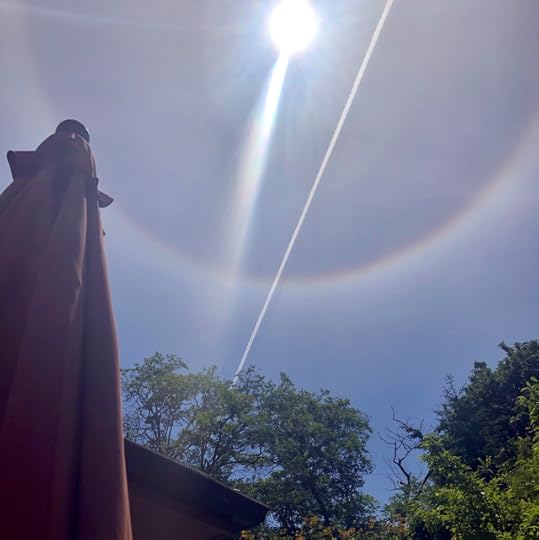
When your writing brain is already blazing and another idea streaks through—taken in early June
I’ve always loved the Matter of Britain: the essential tragedy of the never-ending fight of light and literacy vs. encroaching ignorance and suspicion;1 the intersection of wandering and belonging, Us versus Them; and the hint of mist and moors, menhirs and magic. But I was always put off by the essential straight, white, classist, nativist Christian touch-points of the legend. So last summer, when Jenn Northington and Swapna Krishna asked me to contribute to an anthology of queer Arthurian stories, I almost said No. But then an image dropped into my head—a cave, a girl, and a woman in red armour—and I saw how I could write a short story that took the myths and legends of first millennium Britain and blended them with real-world events like climate change, mass migration, and the multi-ethnic Roman occupation of Britain, to make something new. So I said Yes. They paid me half in advance and gave me a deadline of mid-January. I cashed the cheque and went back to working on Menewood.
Fast-forward to mid-January, when my brain was ablaze with Menewood, and I got email from Jenn reminding me the story was due the next day. I had totally forgotten (because Menewood, because blazing, and also because I saw the pandemic heading towards us like a freight train and was planning for that). So I wrote back and told Jenn I hadn’t started it but that if she gave me three weeks I was confident I could get it done. And I was confident—it turned out that those initial ideas had been breeding and mutating and were definitely alive and ready to be born. I set Menewood aside, opened a new document titled “Red,” and began.
But here’s the thing: I hadn’t reckoned on the energy that reworking the myth I’ve known all my life would unleash in me; it was like riding a rocket powered by sheer joy. In 3 days I had already roared past the 10,000 limit. I told Jenn it was going to be a long novelette rather than a short story. She said that was okay because some of the other contributions were coming in a bit short. I kept going. A week later I had steamed way past novelette length and the story was still not slowing down; I doubted I could even keep it to novella-length without spoiling what it had the potential to become.
It was at this point that I had to choose between being a professional who honoured her contract, or a writer who honoured her story. (To be clear, usually it’s perfectly possible to do and be both; that’s what ‘professional’ means. This time, eh, not so much.) I chose the latter: I apologised profusely and gave the money back.2
The first draft took 17 days. When I was done, “Red” had become Spear, a short novel. (The title may change.)
What occasioned this burst of productivity? Perhaps, it really was the blazing delight of getting to queer the legend I love, to fuck with the the straight, white, male, cis, nondisabled, classist, nativist, patriarchal Christian crap we’re all fed about history all the time. Perhaps it was the opportunity to write a story set in the Long Ago, like Hild, but with magic—not only the wild magic of the landscape, and of love and the human heart, but also the sword-swinging, monster-killing magic of myth and demigods. There again, perhaps what really did the trick was the purchase of our first espresso machine.

The secret of my success?
So what is Spear? Well, Hild, but with magic—Hild let off the leash, unbound by those pesky historical constraints—and set a hundred years earlier, in Wales rather than England. The setting is throughly Celtic-flavoured, and so is the language: instead of spear-straight English I aimed for prose that’s rhythmic and rippling and periphrastic. Arthur’s/Artos’s Companions (aka the Knights of the Round Table) are much more various than the myth, the grail is very much not what it seems, and Caer Leon/Camelot is queered six ways from Sunday. In many ways, though, all that is peripheral. What takes centre stage is the journey of Percival/Peretur, a girl and then young woman who leaves home to find out who she is. Climate change and other real-world events are there as underpinnings—you won’t notice unless you’re looking—but essentially this is a Hero’s Journey, or, more accurately, a Heroine’s Journey. All Heroes set out to win, and Peretur is no exception, but winning for her is not just about the slaying of monsters—which she most definitely does, human and otherwise, with great elan—but about connecting: finding her people and a place to belong. In many ways this book is a kind of homecoming—not just for Peretur but for me: a coming-together of two parts of my career. So I’m thrilled it will be published in an unusual editorial collaboration between two of Macmillan’s imprints: Farrar, Straus and Giroux (publisher of Hild and my other non-SF novels), and Tor.com (publisher of science fiction, fantasy, and horror). Excitingly, there may also be budget for interior illustrations; more on that when I have it—but I think this could be a beautiful, gift-worthy item.
Mainly, though, what I want to convey in this blog post is just how very much I loved every step of this journey. I hope you will too. It will be published in world English in hardcover, ebook, and audio in April 2022.
But wait! There’s more! After finishing Spear I was absolutely and thoroughly revitalised. When I went back to Menewood it blazed along more brightly than before, and now the first draft is done. I don’t think that would have happened without Spear: the sheer energy and joy of that work smashed the box I’d put around both myself and Menewood, and freed the book it could be. I’m pleased with it—I’m delighted with both books. They will, I hope, tear out your heart, sear your soul, and turn your brain inside out. Chortle.
Because I am so fucking happy right now—not only do we have a new administration coming to mitigate some of the horrors of the old; not only are there several vaccines in the works, bringing the end of the pandemic in sight; but in 2022 I will have at least one, possibly two, new books out—only celestial events can come close to mirroring my emotion. So let me bookend this post with a photo I took three months ago. I was standing outside admiring the moon and Mars while a bunny hopped about on the lawn, and then a coyote trotted past and stared (then came back and stared again, probably wanting to know why I wouldn’t let its special little kitty friends out to play). I am still amazed that one can take photos like this with a tiny thing you keep in your pocket (iPhone 8).

Moon and Mars, Oct 2 2020
Life is pretty fucking good.
1 Or, perhaps, liberals vs. conservatives.
2 And the last I heard, my friend Maria (translator-extraordinaire of the fabulous new Beowulf) agreed to write a story to fill that gap—and I know you’ll like that one. So everyone wins.
December 11, 2020
Love and isolation: 31 years ago
I moved to the US 31 years ago today to live with Kelley. We were in a tiny apartment in Duluth, Georgia—in Gwinnett County, a very red county in a very red state. I had no money, no job, no health insurance, and I was sick. We were very isolated: twenty miles from Atlanta with no public transport, not even any sidewalks. But we had what we needed: heat, light, food, and each other. In many ways it felt like living today in the middle of this pandemic. I haven’t been to a restaurant for nearly 10 months. I haven’t had a hug from anyone but Kelley—and the kitties—for almost as long. We don’t have much in the way of accessible public transport out here and there are no sidewalks.
But, oh, so much else is different. We have enough money for the things we need. We have friends and family out there just waiting, like us, for the time when we can throw away our masks, hold out our arms, and hug and laugh and eat together once again. Meanwhile, we have a whole house that’s ours (and, y’know, the bank’s), a car each, two fuzzy kitties, plenty of delicious food, even better drinks, all the TV and books we could possibly need and, of course, each other.
We had to fight hard to be together—at the time it was illegal for queers, communists, and HIV+ people to even enter the US, never mind stay for any length of time. I refused to pretend to be anything but queer, so my immigration case took four years, cost more than $20,000, and made new law. After that mammoth stress the pandemic feels easy; there is nothing, absolutely nothing that could rock our foundations. Kelley is the heart of my life, the axis around which everything else revolves.
Here’s a photo of her I took in her office last month. It’s not carefully posed, the light’s all in the wrong place, and, even so, she’s more herself and so more beautiful now than she was when we met. The best person in the universe to be locked down with. I am profoundly grateful every single day.

Kelley at 60

